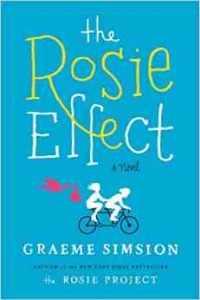
Published by Simon & Schuster on December 30, 2014
Considering that I laughed all the way through The Rosie Project, it didn't surprise me that I started laughing on the first page of The Rosie Effect. Don Tillman, the narrator of the Rosie novels, is now a familiar character. In this case, familiarity breeds glee. This novel might not be quite as funny as the first, if only because the character of Don is less startling in this second encounter, but I still enjoyed it.
The Rosie Effect begins after Don and Rosie have been married for ten months. They are living in New York. Don is teaching at Columbia and Rosie is pursuing her doctorate. Don has managed to make new friends (he now has six), has abandoned the Standardized Meal System, and has agreed that sex should not occur on a fixed schedule. His otherwise orderly life is nevertheless unsettled by an unscheduled pregnancy that makes Rosie's emotions even more impossible for Don to predict.
The pregnancy also raises yet another problem that Don finds perplexing: Is Don fit to reproduce? Opinions are mixed. To address the issue, Don embarks on The Baby Project (i.e., he prepares for "baby production and maintenance"). His efforts are hampered by an interfering social worker who is offended by Don's lack of social skills. His life is further complicated by Gene, one of his six friends, a philandering psychology professor who comes to live with Don after his wife boots him out of the house.
As readers of The Rosie Project know, Don possesses the intellectual rigor of a dedicated scientist but has a shortage of empathy. Rosie has plenty of intellect but usually balances her left brain with her right. In pregnancy, however, Rosie is all about emotion despite her unwillingness to concede that the pregnancy might challenge her. Don's desire to understand Rosie's behavior in terms of its evolutionary origins and to offer "helpful" solutions is, like the rest of the novel, hilarious -- to the reader, but not to Rosie.
Much of Don's thinking makes perfect sense (to me, at least). For instance, having told Rosie that he loves her, why should he ever need to tell her again? After all, love is a "continuous state" and only a change in that state would produce relevant information that needs to be conveyed. The Rosie Effect has some insightful things to say about relationships (and some good advice for men), particularly relationships that might lead to reproduction.
While the novel makes a number of serious points about relationships and the value of truth versus deception, its most important lesson concerns the need to be true to oneself -- even if you are socially maladapted. I value The Rosie Effect and The Rosie Project for the lighthearted approach they use to make serious points, but I value them more for the consistent laughter they provoke.
RECOMMENDED